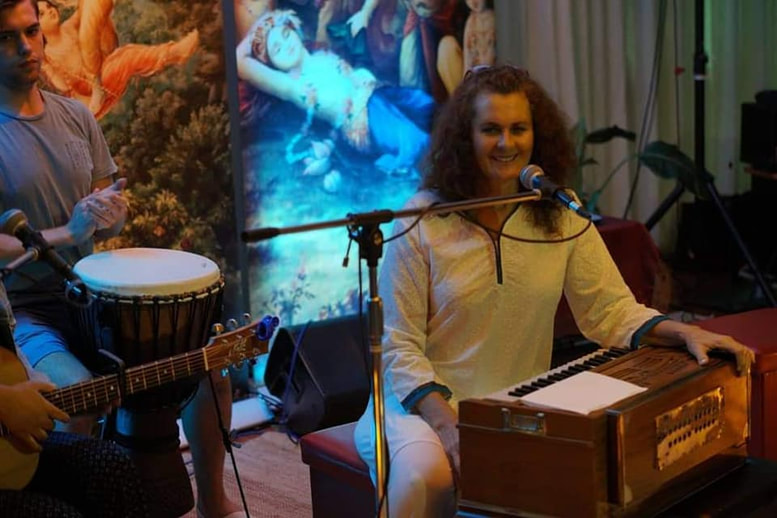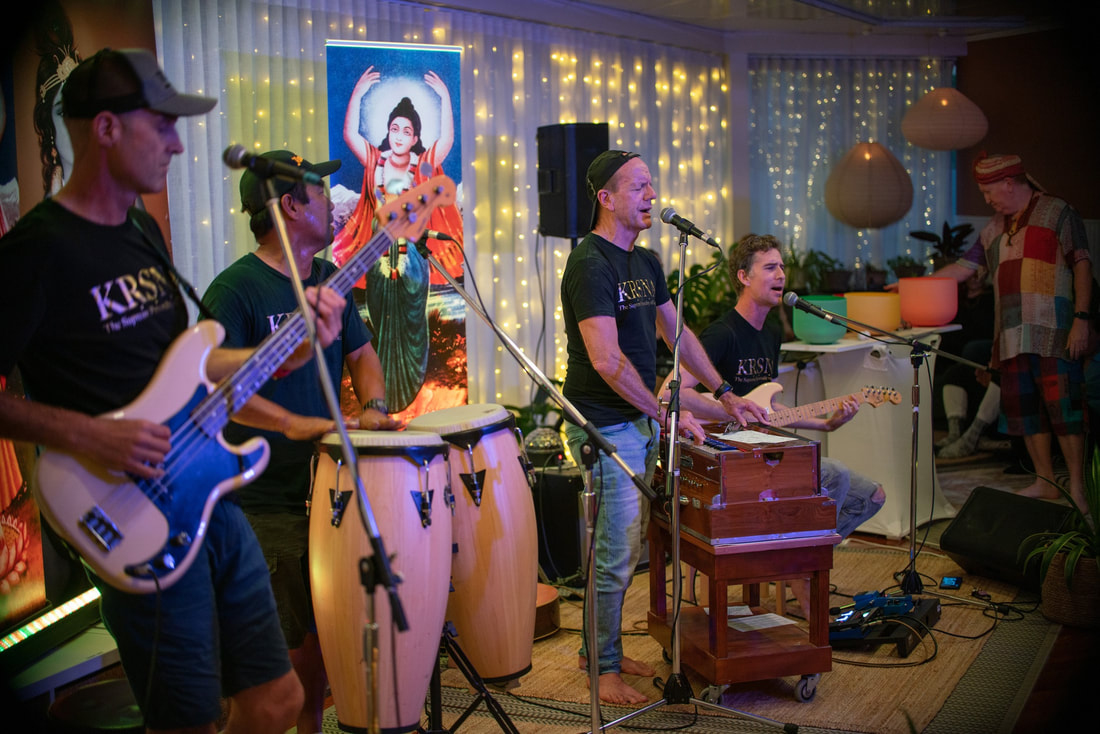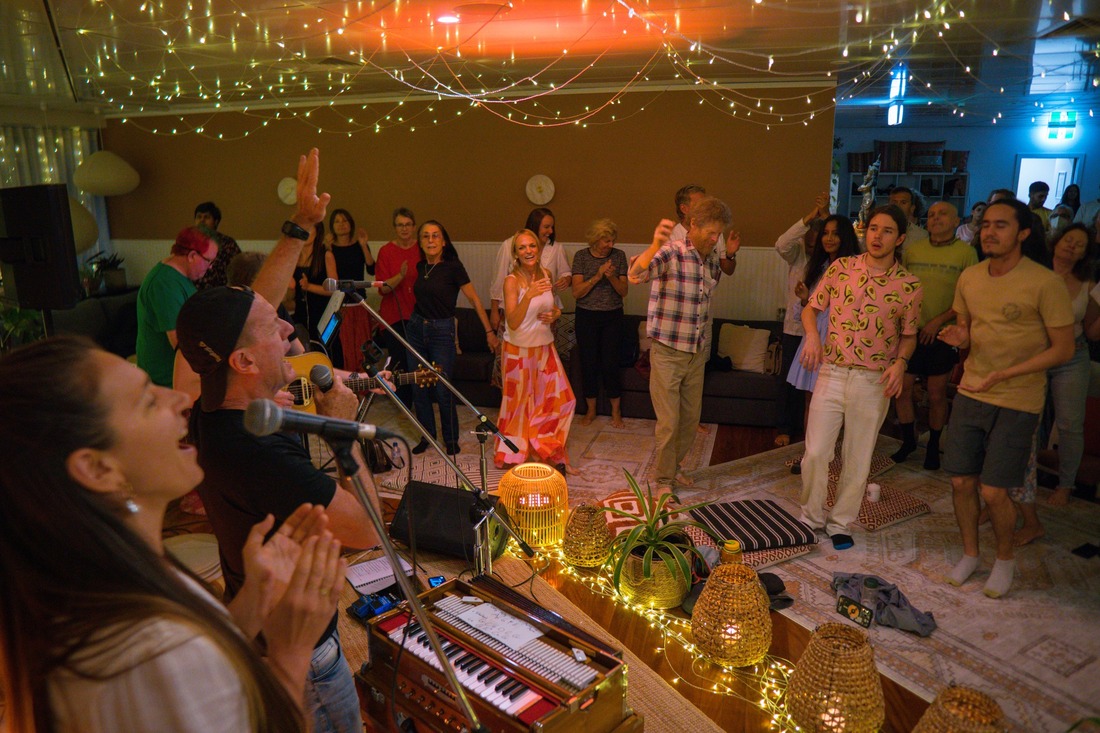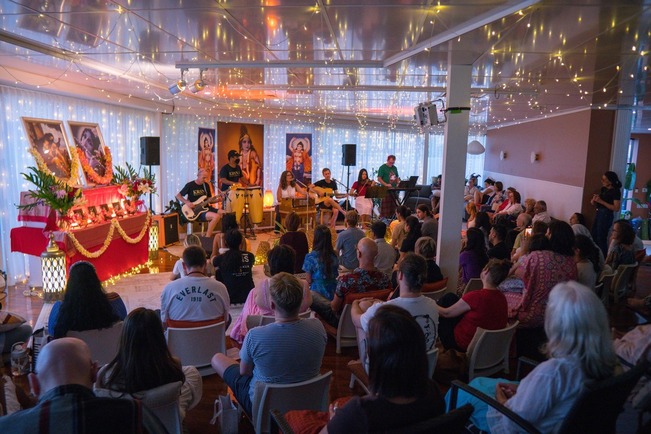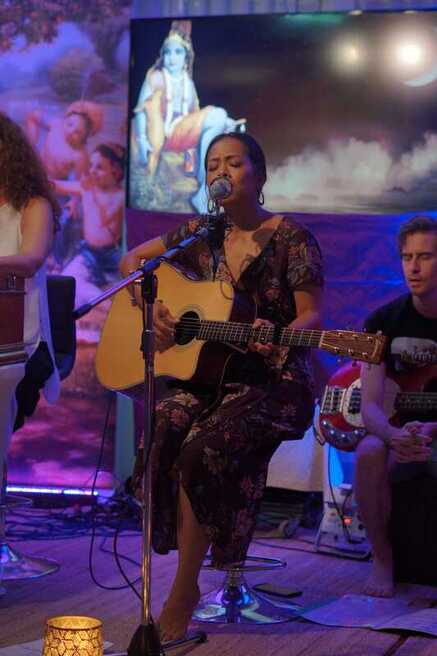The Mantra Room
of West End Brisbane
Pronunciation. A dot or bar above a letter is important, for it indicates proper pronunciation of sacred language. Please read my webpage on Pronouncing Sanskrit.
Gayatri, the Founder and Director of
the Mantra Room, Westend of Brisbane,
performing on harmonium.
the Mantra Room, Westend of Brisbane,
performing on harmonium.
The Mantra Room of West End Brisbane is part of the Australian School of Meditation and Yoga; ASMY. They now offer good kīrtan several evenings a week with video recordings on their Face-book page. Much of this music has good instrumental, good singing, good melody that’s (generally) easy to sing along to. So their music meets my criteria of good kīrtan.
They now have many talented and skilled musicians, who play bass and acoustic guitars, keyboard, hand drums, and harmonium. They have real mastery of both their instrument and the genre of music they play, and are most inspiring. These musicians are very welcoming of me, and I greatly value the good friendship I share with them. I am honoured to provide quality images of them in performance.
The Mantra Room does not usually provide word-for-word translation for their mantras, and the study of Sanskrit is not given much priority there. Instead, the mantra words are presented as transcendental sounds, that have “descended from the spiritual realm to the physical with no loss of potency.” They believe that when the devotee recites these mantras, they will be drawn closer to God, whom they describe as the “Supreme Person”. In India, it’s not customary for the leader to give a talk about the meaning of the mantra when it’s recited. (The audience already knows.)
For the mantras chosen by our Kirtan musicians all have deep spiritual significance. That’s why they have been recited by millions for millennia, in devotional atmosphere. There is powerful “energy” behind them. These mantras are a succinct poetry that express important Dharma themes that can help us in purification practise and our efforts to realise spiritual Liberation. If we can somehow access this knowledge. And one purpose of this website is to explore and reveal this hidden meaning of these mantras.
hare Krishna hare Rama is the principle mantra of the Mantra Room of Westend, and they call it their mahā mantra. They also sing several other mantras too. These include the following Names or nāma for Deity - Govinda, Gopāla, Gauraṅga, Nitai-Gau, Hari, Madāna, Mohana, Murāri, Chaitanya.. Most of these Names appear in one of their mantras : Gopala Govinda Rama Madana Mohana, and I discuss their translation and meaning below ...
Hari Naama Brothers in performance Dancers for Hari Naama Brothers
L to R Nityananda, Ishwara, Jaya Dharma, Garuda with me in center front row!
L to R Nityananda, Ishwara, Jaya Dharma, Garuda with me in center front row!
Long shot of Kirtan at the Mantra Room Westend of Brisbane
The Mantras Discussed.
The words of these mantras describe the experience of Presence, and give some definition to Presence (of Deity). They also help us understand the dynamics of Presence, and how to access it. They are also Names for Deity that are related to Krishna; they are often called “other Names for Krishna”. When we sing them with understanding, this can help us restore Presence into our experience, and return to Presence, return to the enlightened state.
Govinda, Gopāla, Gauraṅga, Nitai-Gau.
Although the Mantra Room uses two different spellings; Go and Gau; in these four Names of Deity or nāma, they use the same pronunciation for these two different spellings. The proper spelling for their pronunciation is ‘go-’ : an important root word in Sanskrit. Since the study of Sanskrit is not emphasised there, they do not provide diacritics for their Sanskrit words and they seem unfamiliar with proper pronunciation of Sanskrit in their talks. More importantly, Kirtan is an oral tradition, so let us go by their pronunciation rather than their spelling of their Kirtan words.
This means that four of their Kirtan words all contain the important Sanskrit root word go- . The simple dictionary meaning of go- is bulls and cows, and useful things that come from cattle in domestic service to people. These include –
- milk and therefore all dairy products like butter (ghee in hot climates), cream, yoghurt, curds and whey (clabbered raw milk), cheese – a wide range of highly nutritious food. Provided we use them properly, to avoid excessive mucus.
- grain, for the ox or bull has the strength to pull the plow, a great help to cereal cultivation.
- transport to market, to bring the food to the people who do not farm.
- manure and important fuel for cooking where trees are scarce.
All these important produce from cattle reveal how much nurturing the cow and bull can provide in traditional fossil fuel free technology. Hence the cow is revered as being almost sacred in bhārata (that we call ‘India.)
In Australia of course, cattle are our principle source of meat, another highly nutritious food. Beef is full of quality animal protein, rich in all the essential amino acids that we need. However, meat is not an acceptable food at the Mantra Room for they are strict vegetarian, and Hindus will not eat beef.
However, go- means more than just cattle and cattle produce. Ādi Shaṅkara was a great sage and writer in bhārata some 1300 years ago, and he and his teacher Govinda Bhagavatpada give further explanation about this important root word.
In Hari Vamsa, Shiva says that Govinda is “Lord of the Vedas”. This could refer to Lord Vishnu’s avatara as Hayagriva, in which He rescued the Vedas (the ancient scriptures of India) from the demons Madhu and Kaitabha. Govinda is another avatar of Vishnu. The Vishnu Sahasranama says that Govinda is ‘known by Vedic words alone’. This suggests that go- can also mean the Vedas or ancient scripture of India, and the spiritual guidance they can provide to us when we use them properly.
In addition, the Shānti Parva of the Maha-bharata (the great epic of bhārata = India), Vishnu restored the Earth after it sank into the netherworld, called “naraga” in Tamil. Thus all devas praise Him as Govinda = “Protector of the Land”. go- also means “from the earth” in the dictionary. This suggests a third meaning for go- : it can mean Mother Nature and the special nurturing She can provide to us when we can respect and connect with Her.
When we broaden out the possible meanings for the root word go-, we also give greatest breadth and depth of meaning to these four Names or nāma that are often used in kirtan in general, and the Mantra Room in particular, thus –
- go- can mean nurturing of body, mind and spirit.
- -vinda means “find, gain”
- -pāla means “develop, practice, and protect”
- -raṅga means “theatre”, both the place and the people involved
- nitai- can mean “reliable, continual, indestructible”
A beautiful and nourishing meal offered
at the Mantra Room Westend on Sunday evenings,
prepared by the devotees.
at the Mantra Room Westend on Sunday evenings,
prepared by the devotees.
madāna mohana murāri
These three Names for Deity, which also go with the Names of Govinda and Gopāla, help us understand how Govinda and Gopāla function in our daily lives. They indicate the Path we need to follow to access Govinda and Gopāla in our experience, and restore them to our daily life where they belong. These Names or nāma appear in the mantra : Gopala Govinda Rama Madana Mohana.
madana or madāna can mean “enchanting, exhilarating, enrapturing, transporting.” Where we are transported from mundane disinterest to real enjoyment, appreciation, inspiration, good will to the people and pursuits of our lives. Thus madāna takes us to the space and place where the spiritual Qualities or bodhyaṇga are fully developed and in charge of our life’s experience.
For the beginner in spiritual practice, madāna is a special experience, perhaps event or venue or scenery, that somehow takes them to that ‘special place.’ But with maturity and experience in spiritual practice or bhāvana, we come to realise that we can train our mind and tame our heart for this same purpose. Then we can consciously and purposefully rise up to madāna on a regular basis, we can head towards the Presence of Deity and make ourselves receptive and open to it. With further training and maturity, then the enlightened state can be restored into much of our daily lives, where it belongs. Provided we are both practised and practising.
Those people who have no interest nor training in spiritual practice might mistake the freedom of enjoyment, upliftment, appreciation, flexibility, and zest of madāna with intoxication on drugs and/or alcohol. Indeed, intoxication is the poor man’s poor substitute for the beauty of spiritual Liberation, and the drunken and stupefied state invades far too much of their daily lives.
So madāna can also mean ‘intoxication, love-sick’ for madāna can appear like that to the blind observer. Which leads us to the meaning of the Name for Deity that follows …
mohana can mean “incomprehensible to the ego or lower self.” The transcendence of madāna is beyond the understanding of the ego, for the ego believes we should solve our pressing problems by endlessly thinking about them, becoming enmeshed in them, and thus contributing to them.
murāri can mean “transcending pain and difficulties”. Learning the skills of letting go of pain filled and pain driven thoughts and feelings. Learning how to stop fuelling the fires of suffering, stop identifying with defiled thought, stop energising the problem and move towards the real solution instead. This might involve some investigation – how much of this pain is needless worry, and how much is legitimate concern?
murāri also includes persistence, to persistently let go of the obsessions and worries, over and over again, whenever they arise. Until they weaken, dissolve and dissipate, pass out of our Being and cease to trouble us.
Thus madāna complements murāri, the former focusses on rising up to the wholesome, the latter focusses on letting go of that which prevents us from rising up.
Chaitanya revived the practice of reciting the hare Krishna hare Rama mantra, ecstatic dance to the music of Kirtan, and the study of the Bhagavad Gita, some 500 years ago in India. He is an important early pioneer of the tradition of the Mantra Room. Reciting his name can remind us of the importance of good leadership.
Like most Sanskrit names, ‘Chaitanya’ has significance. chait = chit = chitta = thought or mind state. chaitan = conscious, chaitanya = consciousness. In this context, Chaitanya can mean pure consciousness, that is completely free of all defilement.
rama means “delight, enjoyment, beauty”. It appears in the hare Krishna hare Rama mantra.
Hari can be a general Name or nāma for Deity, and can stand for many other Names. Thus -
Hari bol usually means “sing aloud (bol) the Name(s) of Deity!”, or “let’s all join in!”
Anah leading on guitar, Garuda backing.
Derivation Details
vinda as a mere dictionary word means “keep, protect”. This suggests the essential spiritual practice of cultivating, developing, practicing the spiritual Qualities or bodhyaṇga, and then protecting them from self sabotage.
nitai- as in nitai-gau is short for Nityananda + Gauranga (Chaitanya). These two pioneers worked together in India 500 years ago to revive kirtan, especially with ecstatic dancing, and the study of the Bhagavad Gita. Thus nitai can stand for nitya = reliable, eternal, stable as a dictionary word. nitya also means being intent on, focussing attention. It also means ‘innate, native’. All these meanings give special focus on the important spiritual practice of nurturing body, mind and spirit.
mādana and madana both mean “exhilarating, delighting” or even “intoxicating”, as mere dictionary words. madāna is not a dictionary word, yet at the Mantra Room the pronunciation is definitely madāna. So I have used this spelling in my discussion.
mohana means “stupefying, confusing” in the dictionary. This suggests something confusing to one’s own ego, and something that seems to be stupefying to the untrained observer.
muraḥ, in the dictionary, is a demon slain by kṛṣṇa. This demon can correspond to the obstacles, pain and problems that block our access to the Presence of Deity, and stop us practising the spiritual Qualities or bodhyaṇga.
murāri, in the dictionary, means “the enemy of muraḥ.” This suggests the essential Goal of spiritual practice or bhāvana; to transcend and overcome these obstacles, pain and problems; which can be real demons for us in daily life.
Copyright© Mike Browning 2023. You are permitted and encouraged to copy from this page, and use as you see fit, provided it is not harmful to mantra-translate.
However, Copyright © cannot be claimed for dictionary meanings, for these come from ancient tradition.
However, Copyright © cannot be claimed for dictionary meanings, for these come from ancient tradition.
